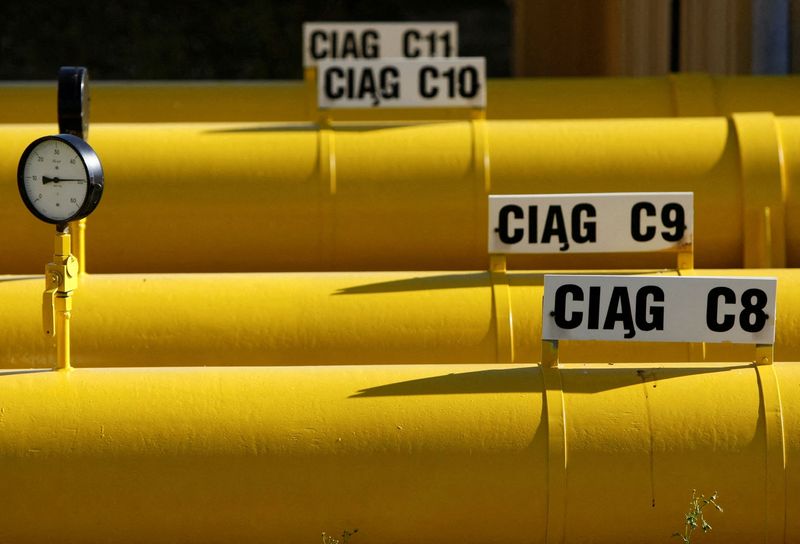By Susanna Twidale
LONDON (Reuters) -Even if Europe can fill its gas storage, Europe faces a perilous winter and governments will need to keep rationing plans to hand as they race to secure more liquefied natural gas (LNG) to keep pace with a rapid shift away from reliance on Russian fuel.
For European households, meanwhile, there is little respite from sky-high fuel prices that have strained budgets, driven down disposable income and weighed on the economic outlook.
The European Union aims to end reliance on Russian fossil fuels by 2027. But Moscow has already cut gas flows to Bulgaria, Poland, Finland, Danish supplier Orsted, Dutch firm Gasterra and Shell (LON:RDSa) for its German contracts, after they all rejected a Kremlin demand to switch to payments in roubles.
The 27-member European Union, which has traditionally depended on Russia for 40% of its gas needs, aims to have its gas storage 80% full by November from about half full now to see it through winter, when stored gas usually meets about a quarter of demand. Analysts say it is on track.
But it still leaves a big gap to fill from other sources, such as LNG, and it will be even bigger if Russia cuts flows to more European buyers, although Moscow says it is meeting its obligations and sees no need to halt supplies to other clients.
SURGING DEMAND
"A complete halt to Russian flows would undoubtedly be Europe's worst-case scenario for this winter as the continent is unlikely to be able to source sufficient supplies from other producers to offset such a significant supply disruption," said Leon Izbicki, European natural gas associate at Energy Aspects.
Even before Russia invaded Ukraine in February, sparking an energy crisis in Europe, demand for gas had been surging in the post-pandemic recovery. The market for LNG, which is dominated by long-term contracts, was already as tight as a drum.
The EU has lifted LNG purchases, with imports up about 58% in the first five months of 2022 compared with 2021 levels, Refinitiv data showed, as more capacity came on stream in the United States and high prices in Europe attracted cargoes.
LNG DISRUPTIONS
The United States, a major LNG producer, has promised to help Europe with more shipments.
But Europe has limited capacity to receive LNG and, adding to uncertainty, Freeport LNG, operator of one of the largest U.S. export plants, said on Tuesday it would take at least 90 days to resume partial operations after an explosion last week.
"If Europe goes into winter relying on just LNG supplies, then things could get sticky," said Evangeline Cookson, research analyst and meteorologist at commodities broker Marex.
Unlike piped gas which can be ramped up swiftly, shipping LNG can take weeks and can be disrupted by the weather.
The U.S. National Oceanic Atmospheric Administration said last month there was a 65% chance of an above-normal Atlantic hurricane season including six to 10 hurricanes.
Izbicki of Energy Aspects said gas in storage could see Europe through 2022, even without Russian supplies, but that would leave it struggling when winter comes in late 2023, so governments could not yet shelve their rationing plans.
Germany, which has historically relied on Russia for about half its gas needs, has already launched plans for an auctioning system to help ration gas to energy-intensive industries if supplies are cut.
France has implemented measures to limit gas supplies to large consumers in the event of any shortages.
Poland, already cut off from Russian gas, has boosted LNG imports, opened a gas link to Lithuania in May and aims to open a new pipeline this year to Norway. But it still has plans in place for curbing gas to heavy industry in a crisis so that it can keep homes and public services supplied.
Yet rationing would carry a heavy economic price. Berenberg chief economist Holger Schmieding estimated EU economic output would be 2% lower by the end of 2022 if Russian supplies were shut off now.

Gas accounts for more than 20% of EU energy use, heating homes, generating electricity and used in the manufacture of vital products such as fertiliser. Meanwhile, the surging cost of fuel is already having a knock-on effect.
"Even without an embargo, the high prices for gas are taking a heavy toll on consumers, leaving them less money to spend on other goods and services," Schmieding said.